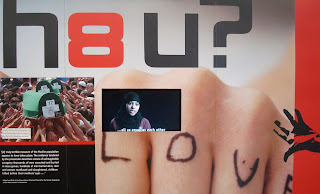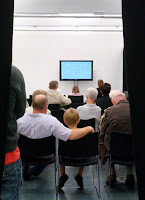
Anne Frank [+ you} is a touring exhibition that looks at the life and death of Anne Frank during the Second World War, and relates it to contemporary discrimination, exclusion and other social issues facing today’s society.
“Anne Frank represents over 1 million children put to death by Nazis during the Second World War.”

Having already spent time this year in Strabane as well as the Spectrum Centre on the Shankill Road, on Monday the exhibition opened in Mossley Mill, Newtownabbey Borough Council’s Civic Centre off Carnmoney Road North beside Mossley railway halt.
Northern Ireland Friends of Israel hosted a packed reception on Tuesday night to welcome the exhibition to the area. Launched in March 2009, amongst NIFI’s other aims is the desire to
foster strong cultural, economic and political ties between Northern Ireland and Israel, to build a better understanding between the peoples of Northern Ireland and of Israel.
Newtownabbey’s Mayor Paula Bradley spoke warmly (and ably) about the effect Anne Frank’s Diary had on her when she read it first as a child and then subsequently as she grew older. Gillian Walnes – director of the Anne Frank Trust UK – introduced the exhibition and gave a synopsis of Anne’s life along with a call to
“reflect on the injustices around us, in this country and right the way around the world.”
And the Minister for Culture Arts and Leisure Nelson McCausland, who had helped orchestrate the exhibition on the Shankill Road, spoke of the particular power a personal story has to give insights into issues and to “ask about the moral questions we face today”. (Nelson blogged about the launch event.) He also felt that
“through art and creativity we can engage with culture and educate others.”
The exhibition on the third floor of Mossley Mill walks through the timeline of Anne Frank’s life and the Holocaust. There’s a near life size replica of her room in the secret Annexe.
Having spent more than two years concealed, someone snitched and the eight Jews who had been hiding were arrested by the German and Dutch authorities.

Anne died less than a year later in Bergen-Belsen concentration camp following a typhus epidemic. Of the eight, only her father – Otto Frank – survived to the end of the war. He published Anne’s diaries.

Behind the section of the exhibition focussing on the Frank family is material that explores
- Political persecution and injustice – Tibetan protesters in London during the Olympic Torch relay; Muslim girls not being allowed to wear headscarves to school; Aung San Suu Kyi’s detention in Burma.
- Racial abuse – with a video message from Ashley Cole; the murder of 18 year old Stephen Lawrence in 1993 by a gang of 5 or 6 white youths; 7,000 Muslim men and boys murdered by Christian Bosnian Serbs in Srebrenica.
- Indifference and responsibility – which looked at the Zimbabwean cricketers Andy Flower and Henry Olonga who chose to wear black armbands during the 2003 Cricket World Cup to “mourn the death of democracy in our beloved Zimbabwe” and who suffered the consequences.
- Conflicts and peace.
- Inclusion and exclusion.

There’s also a short film (with a seated area) which provides greater detail about Anne Frank’s story than is covered on the exhibition posters. It’s very much aimed at teenage school children, though has plenty to say to adults too!
The exhibition is open Monday – Saturday in Mossley Mill until 29 September when it will transfer to Lisburn Library (3 – 30 October) before heading to Newry and possibly Enniskillen later in the year.
Visitors are encouraged to leave comments. One summed it up well:

2 comments:
Thanks so much for giving the event such warm support.
It was an amazing turn out, all speakers eloquently summarised the importance of the exhibition and the need for exploration of its key messages. What an achievement it would be if we could cement this excellent work and move towards the establishment of a permanent Anne Frank Trust (UK) office in Northern Ireland. An exciting goal!
With very best wishes,
Steve Nimmons
Special Advisor (Northern Ireland), Anne Frank Trust UK
"One summed it up well:"
Shame we never seem to learn...
Post a Comment